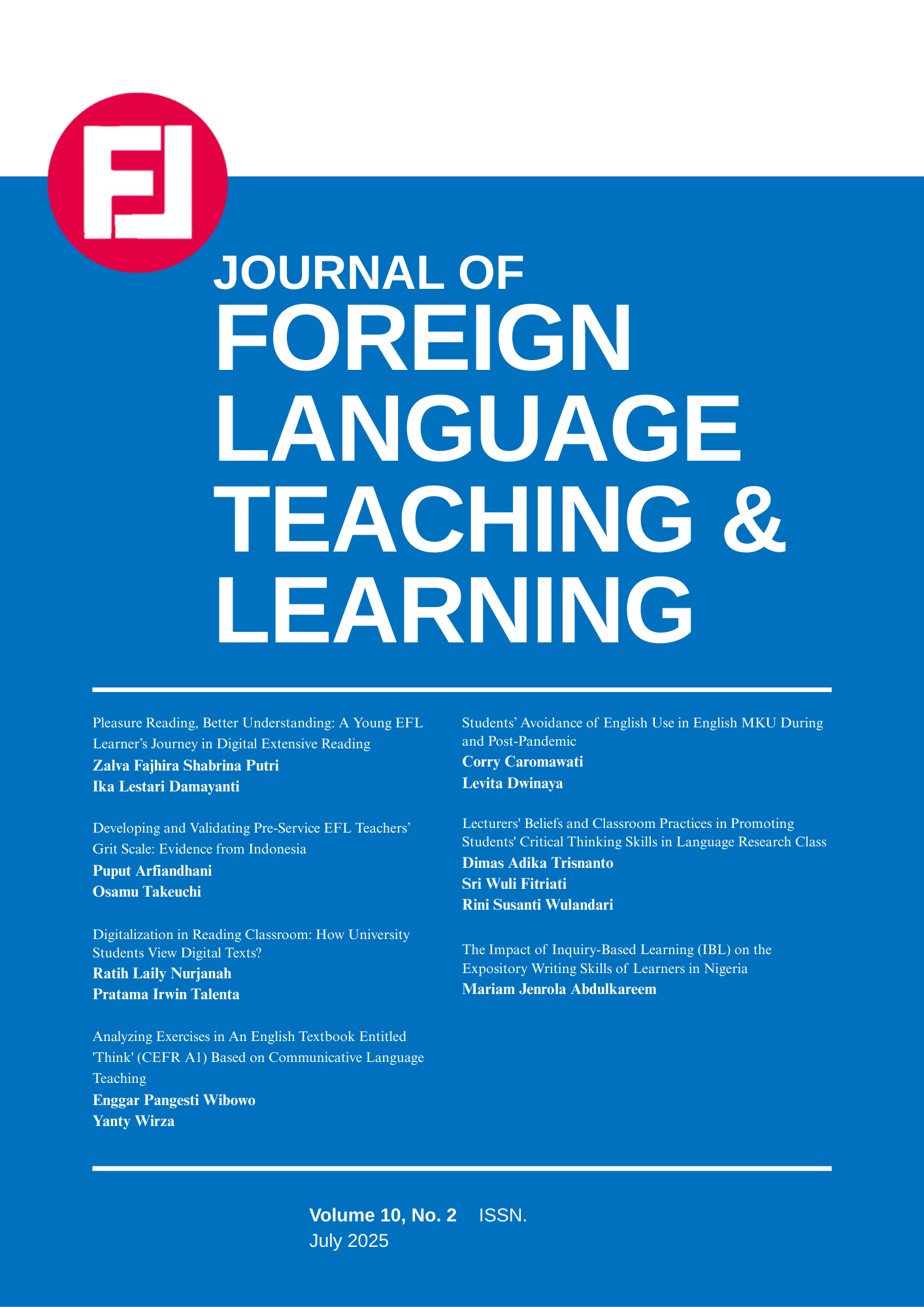The Impact of Inquiry-Based Learning (IBL) on the Expository Writing Skills of Learners in Nigeria
An Experimental Study on Improving Writing Structure and Organization
DOI:
https://doi.org/10.18196/ftl.v10i2.26811Keywords:
expository writing, inquiry-based learning, writing skills, secondary schoolAbstract
Background: The Nigerian English language curriculum for writing mostly encourages a teacher-centred approach whereby the teacher simply gives writing task to students and leave them to figure it out on their own. This leaves many of the students stuck and thereby losing interest in English composition.
Objective: This study hereby investigates how Inquiry-Based Learning (IBL) impacts the writing performance of secondary school students in Nigeria to see if a more student-centered approach might change the students’ perspective and performance. The study specifically focuses on organization and structure in expository writing. It primarily aims to determine whether using a student-centred approach like IBL can improve students’ writing performance.
Methods: A seven-week experimental study was conducted, and this involved an experimental group that was taught using IBL strategies and a control group that received traditional instruction. At the beginning of the study, each group consisted of 20 students, making the initial sample size 40. However, only 10 students from each group completed both the pre-test and post-test, which resulted in 20 valid responses. This reduction was largely because of the students’ motivation and attitudes toward the process, which affected their participation. Data collection included pre-tests and post-tests to assess students’ writing performance.
Findings: The results of the experiment underscore that no significant differences were observed between the performance of the experimental and control group. While IBL did not lead to measurable improvements in students’ ability to organize and structure expository essays, the study highlights the value of active student engagement in the learning process.
Conclusion: The findings suggest that the results may differ with a larger sample size and a longer period of intervention.
References
Ali, H. F. (2020). The effect of inquiry-based approach on development of reading and writing skills of a university EFL students. SSRN Electronic Journal. https://doi.org/10.2139/ssrn.3621259
Al Maharma, H., & Abusa’aleek, R. (2022). Teachers’ challenges in using inquiry-based strategy in teaching English in Jordan. International Journal of Educational Sciences, 38(1–3), 1–7. https://doi.org/10.31901/24566322.2022/38.1-3.122
Amelia, M., & Prystiananta, N. C. (2021). Using inquiry-based learning strategy in teaching writing descriptive text. Linguistic, English Education and Art (LEEA) Journal, 5(1), 1–10. https://doi.org/10.31539/leea.v5i1.2648
Anh, D. T. N. (2019). EFL student’s writing skills: Challenges and remedies. OSR Journal of Research & Method in Education, 9(6[1]), 78–84.
Arifin, Z., Sukarmin, S., Saputro, S., & Kamari, A. (2025). The effect of inquiry-based learning on students’ critical thinking skills in science education: A systematic review and meta-analysis. EURASIA Journal of Mathematics, Science and Technology Education, 21(3), em2592. https://doi.org/10.29333/ejmste/15988
Bora, P. (2023). Importance of writing skill to develop students’ communication skill. JRSP ELT, 7(35). https://doi.org/10.54850/jrspelt.7.35.009
Ermawati, Y. N., & Pammu, A. (2017). The implementation of inquiry-based learning to reading comprehension of EFL students. International Journal of Science and Research (IJSR), 6(3), 1067–1071.
Gómez Morocho, M. d. C., & Pérez Lema, G. E. (2022, September 5). The influence of inquiry based learning on English language learners’ writing performance (Bachelor’s thesis). Universidad de Cuenda, Ecuador.
https://repositorioslatinoamericanos.uchile.cl/handle/2250/4622313
Graham, S., Gillespie, A., & McKeown, D. (2013). Writing: Importance, development, and instruction. Reading and Writing, 26(1), 1–15. https://doi.org/10.1007/s11145-012-9395-2
Hamid, S. M., Mannong, A. B. M., Hidayat, N., & Insyirah, L. (2021). The effect of inquiry-based learning on secondary student learning outcomes in writing ability. Journal of Development Research, 5(2), 126–131. https://doi.org/10.28926/jdr.v5i2.179
Isra’, H., & Asrobi, M. (2018). The use of inquiry-based learning strategy in teaching writing skill for the eighth grade students junior high school. Voices of English Language Education Society (VELES), 2(1), 29–37. https://doi.org/10.29408/veles.v2i1.606.g429
Iwe, N. N., Chidi-Onwuta, G., & Chikamadu, C. P. C. (2022). Evaluating the effects of inquiry-based learning on Nigeria students’ oral and written communication, 2(2).
Juansyah, M., Arono, & Yunita, W. (2024). Enhancement of students' critical thinking skills and writing achievement through guided inquiry learning. Journal of English Education and Applied Linguistics, 13(3). https://doi.org/10.24127/pj.v13i3.9888
Kasmaini, & Zahrida. (2022). Improving students’ writing ability by using inquiry-based learning model. ENGLISH FRANCA: Academic Journal of English Language and Education, 6(1), 99-115. DOI: 10.29240/ef.v6i1.4117
Moses, R. N., & Mohamad, M. (2019). Challenges faced by students and teachers on writing skills in ESL contexts: A literature review. Creative Education, 10(13), 3385–3391. https://doi.org/10.4236/ce.2019.1013260
Oxford University Press ELT. (2020, January 29). Inquiry-based learning: 4 essential principles for the ELT classroom. Oxford University Press ELT. https://teachingenglishwithoxford.oup.com/2020/01/29/inquiry-based-elt-classroom/
Rejeki, S. (2017). Inquiry-based language learning (IBLL): Theoretical and practical views in English classroom. English Franca, 1(2), 135–142.
Roslan, A. N., Phang, F. A., Pusppanathan, J., & Nawi, N. D. (2023). Challenges in implementing inquiry-based learning (IBL) in the physics classroom. AIP Conference Proceedings, 2569(1). AIP Publishing.
Sari, F., & Wati, I. (2017). Enhancing students’ reading ability through inquiry-based learning to EFL students. English Community Journal, 1(1), 60. https://doi.org/10.32502/ecj.v1i1.653
Shanmugavelu, G., Parasuraman, B., Ariffin, K., Kannan, B., & Vadivelu, M. (2020). Inquiry method in the teaching and learning process. International Journal of Education, 8(3).
Spronken-Smith, R. (n.d.). Experiencing the process of knowledge creation: The nature and use of inquiry-based learning in higher education. University of Otago.
Suteja, S., & Setiawan, D. (2022). Students’ critical thinking and writing skills in project-based learning. International Journal of Educational Qualitative Quantitative Research, 1(1), 16–22. https://doi.org/10.58418/ijeqqr.v1i1.5
Taber, K. S. (2019). Constructivism in education: Interpretations and criticisms from science education. In Information Resources Management Association (Ed.), Early childhood development: Concepts, methodologies, tools, and applications (pp. 312–342). IGI Global.
Wale, B. D., & Bishaw, K. S. (2020). Effects of using inquiry-based learning on EFL students’ critical thinking skills. Asian-Pacific Journal of Second and Foreign Language Education, 5(1), 9. https://doi.org/10.1186/s40862-020-00090-2
Wale, B. D., & Bogale, Y. N. (2021). Using inquiry-based writing instruction to develop students’ academic writing skills. Asian-Pacific Journal of Second and Foreign Language Education, 6(1), 4. https://doi.org/10.1186/s40862-020-00108-9
Ybanez, R. A., & Barcelona, K. E. P. (2024). Addressing college students’ writing difficulties through cooperative learning and inquiry-based learning approaches. Burapha Educational Journal, 45(1), 78–95. https://doi.org/10.14456/bej.2024.6
Downloads
Published
How to Cite
Issue
Section
License
Copyright (c) 2025 Mariam Jenrola Abdulkareem

This work is licensed under a Creative Commons Attribution-ShareAlike 4.0 International License.
Copyright
Authors retain copyright and grant the journal right of first publication with the work simultaneously licensed under a Creative Commons Attribution-ShareAlike 4.0 International License that allows others to share the work with an acknowledgment of initial publication in this journal.
Authors are permitted and encouraged to post their work online (e.g., in institutional repositories, social media account, or on their website) after the article getting published in the journal, as it can lead to productive exchanges and earlier and greater citation of published work (See The Effect of Open Access).License
You are free to:
- Share — copy and redistribute the material in any medium or format
- Adapt — remix, transform, and build upon the material for any purpose, even commercially.
Attribution — You must give appropriate credit, provide a link to the license, and indicate if changes were made. You may do so in any reasonable manner, but not in any way that suggests the licensor endorses you or your use.
ShareAlike — If you remix, transform, or build upon the material, you must distribute your contributions under the same license as the original.
- No additional restrictions — You may not apply legal terms or technological measures that legally restrict others from doing anything the license permits.



.png)





